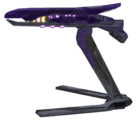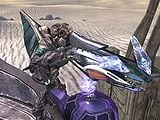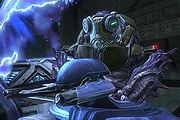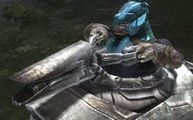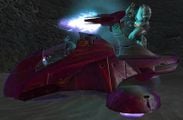Class-1 directed energy cannon: Difference between revisions
From Halopedia, the Halo wiki
BaconShelf (talk | contribs) m (Undo revision 1382680 by 209.58.147.242 (talk) - never been referred to by this name) Tag: Undo |
(→Trivia) |
||
| Line 32: | Line 32: | ||
==Trivia== | ==Trivia== | ||
*The first type of plasma cannon to appear in the games was the Type-42 DESW, which appeared in ''[[Halo 2]]''. Its replacement, the Type-52, first appeared in ''[[Halo 3]]'' and has filled the role of the primary Covenant plasma cannon in all subsequent games. Unlike the Type-42 DESW, the Type-52 DESW could now be detached from its tripod mount and become man-portable, at the cost of maneuverability and of limited ammunition (only 200 rounds). | *The first type of plasma cannon to appear in the games was the Type-42 DESW, which appeared in ''[[Halo 2]]''. Its replacement, the Type-52, first appeared in ''[[Halo 3]]'' and has filled the role of the primary Covenant plasma cannon in all subsequent games. Unlike the Type-42 DESW, the Type-52 DESW could now be detached from its tripod mount and become man-portable, at the cost of maneuverability and of limited ammunition (only 200 rounds). | ||
*In ''Halo: Reach'', the plasma cannons overheat with prolonged use. | *In ''Halo: Reach'' and ''Halo 4'', the plasma cannons overheat with prolonged use. | ||
==Gallery== | ==Gallery== | ||
Revision as of 13:11, December 13, 2020
Class-1 directed energy cannon,[1] colloquially referred to by the broad term plasma cannon, is a category of manned automatic plasma turrets used by the Covenant. Several models have been identified, including the Type-52 DESW and the Type-42 DESW.
Design details and operation
Plasma cannons are generally found on tripod mounts, but can also be attached to certain vehicles. Some models can be detached from their mount and become man-portable, usually wielded by Jiralhanae War Chieftains, Jiralhanae Chieftains and Sangheili Generals. Plasma cannons are often strategically placed, usually in locations where the much larger Shade cannot fit. The turrets usually have a very high rate of fire and most of them are used as anti-infantry weapons.
Variants
Type-29 Anti-Infantry Weapon Emplacement/Mounted
The Type-29 Shadow, colloquially known as the Shadow, is also equipped with a type of medium plasma cannon.[2] In outward appearance, the weapon is similar to the Type-29 Anti-Infantry Stationary Gun, although it fires plasma bolts similar to the T-27 variant and has a considerably greater rate of fire.[3]
Type-42 Directed Energy Support Weapon
- Main article: Type-42 Directed Energy Support Weapon
The Type-42 DESW is a tripod-mounted plasma cannon and is used as a heavy support weapon in ground-based combat and provides a rapid stream of powerful plasma rounds to suppress enemy movements and offensive actions. The turret is placed in strategic locations and can be operated by most Covenant infantry. The turret only has a 65 degree turn radius and 50 degree pitch and fires plasma bolts similar to that of the Plasma Rifle.[3]
Type-46 Directed Energy Weapon/Mounted
The Type-46 Infantry Support Vehicle, also known as the Spectre, is fitted with an energy turret classified as a T-46 Directed Energy Weapon/Mounted,[4] which is mounted at the Spectre's rear with a 360 degree turn radius. In comparison with the Type-52 Prowler ISV's cannon, the Spectre's weapon is superior in terms of accuracy and rate of fire.[5]
Type-52 Directed Energy Support Weapon
- Main article: Type-52 Directed Energy Support Weapon
The Type-52 DESW is the universal replacement of the Type-42 DESW. The Type-52 DESW is very similar to the older version, having roughly the same rate of fire, the same damage per hit and the same range. If the T-52 is removed from its tripod mount in order to be used as a man-portable weapon, its ammunition capacity will be limited to 200 rounds.[6]
Medium plasma cannon (Wraith)
The Type-26 Wraith, commonly identified as the Wraith, is equipped with a unique type of plasma turret classified as a medium plasma cannon.[7] It is fixed on a ring mount on top of the vehicle. The turret is composed of a central bulb and two prongs on either side of it that produce the plasma. This version is nearly identical to the Type-52 DESW, but has a much greater turn radius and is primarily used to protect the vehicle from boarding. The turret is mainly used by Heavy Grunts, Brutes and sometimes even Elites.[6]
The Type-52 Anti-Aircraft Wraith is also equipped with a medium plasma cannon to prevent boarding.[8]
Light plasma cannon (Prowler)
The Type-52 Infantry Support Vehicle, more commonly known as the Prowler, is also outfitted with a unique version of the plasma cannon, classified as a light plasma cannon.[9] This version, like the one mounted on the Wraith, is situated in a ring mount on top of the vehicle and is mainly used to protect the vehicle from boarding. The turret is aesthetically different from the Wraith-mounted version, sharing the crude aesthetic characteristic of Jiralhanae-manufactured technology as opposed to the organic and sleek designs of most Covenant equipment. It possesses a long barrel inside a type of cylinder and bigger handles, but is otherwise identical to the Wraith turret, with the same firing rate, accuracy and damage. This version is almost always operated by a Brute.[6]
Trivia
- The first type of plasma cannon to appear in the games was the Type-42 DESW, which appeared in Halo 2. Its replacement, the Type-52, first appeared in Halo 3 and has filled the role of the primary Covenant plasma cannon in all subsequent games. Unlike the Type-42 DESW, the Type-52 DESW could now be detached from its tripod mount and become man-portable, at the cost of maneuverability and of limited ammunition (only 200 rounds).
- In Halo: Reach and Halo 4, the plasma cannons overheat with prolonged use.
Gallery
List of appearances
- Halo: Combat Evolved (First appearance)
- Halo 2
- Halo 3
- Halo 3: ODST
- Halo Legends
- Halo: Blood Line
- Halo: Combat Evolved Anniversary
- Halo: Reach
- Halo 4
- Halo 2: Anniversary
- Halo 5: Guardians
- Halo Wars 2
- Halo: Envoy
- Halo: Oblivion
- Halo: Shadows of Reach
Sources
- ^ Halo Waypoint: Plasma Cannon
- ^ Halo: The Essential Visual Guide, page 172
- ^ a b Halo 2
- ^ Halo Waypoint: Spectre
- ^ Halo: The Essential Visual Guide, page 184
- ^ a b c Halo 3
- ^ Halo: The Essential Visual Guide, page 206
- ^ Halo: The Essential Visual Guide, page 9
- ^ Halo: The Essential Visual Guide, page 150
